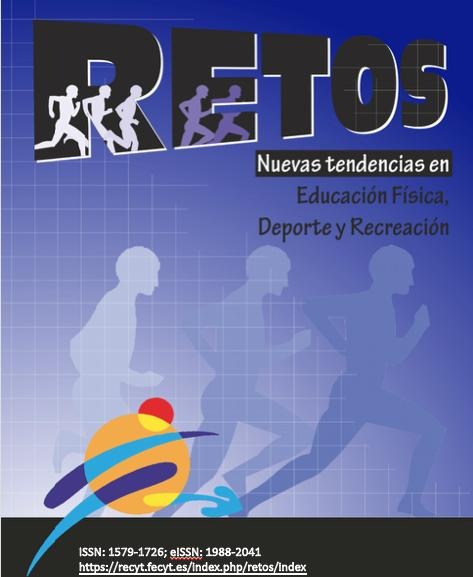Trends in research on vocation and career choice in Physical Education, sport, and recreation: a bibliometric analysis (2000–2025)
DOI:
https://doi.org/10.47197/retos.v72.117494Keywords:
Career choice, physical activity , Physical Education, recreational activities, vocational guidanceAbstract
Introduction: Physical education, sport, and recreation are areas of professional training characterized by a growing diversity in vocational motivations and career choice processes.
Objective: To conduct a bibliometric analysis of research on vocation and professional choice in physical education, sport, and recreation during the period 2000–2025.
Methodology: The study was developed under a quantitative approach, with a bibliometric design and an exploratory and descriptive scope.
Results: The annual evolution of publications during the period analyzed was evidenced, distributed across different countries and academic contexts. The trend revealed a progressive growth, which became more consolidated between 2018 and 2023.
Discussion: When comparing the findings with previous studies, convergences and nuances were identified that enrich the understanding of the subject.
Conclusions: The findings confirmed that academic interest in the study of vocational guidance and professional decisions in the field of physical activity progressively consolidated, responding to the need to understand the factors influencing the training and development of future professionals in the area.
References
Andrew, K., Richards, R., & Padaruth, S. (2017). Motivations for Pursuing a Career in Physical Educa-tion: The Rise of a Fitness Orientation. Journal of Physical Education, Recreation & Dance, 88(4), 40–46. https://doi.org/10.1080/07303084.2017.1280438
Bisquerra, R. (2009). Metodología de la investigación educativa (2.ª ed.). Madrid: La Muralla.
Echevarría, O., Tamayo, Y., & Jeffers, B. (2020). Talento deportivo: reorientación vocacional. Mundo FESC, 10(S1), 7-13. https://doi.org/10.61799/2216-0388.389
Fang, Y., Xu, T., Ye, M., & Li, C. (2025). The relationship between physical activity and career decision-making self-efficacy in Chinese college students: the mediating roles of self-control and social anxiety. Frontiers in Psychology, 16, 1-11. https://doi.org/10.3389/fpsyg.2025.1541211
Hernández, R., Fernández, C., & Baptista, P. (2014). Metodología de la investigación (6.ª ed.). México: McGraw-Hill.
Hernández, V., Carné, J., Jové, C., & Reverter, J. (2025). Global research trends on physical education practices: a bibliometric analysis and science-mapping study. Frontiers in Sports and Active Liv-ing, 7, 1-14. https://doi.org/10.3389/fspor.2025.1532754
Limones J., & Velasco, G. (2025). La vocación profesional y el rendimiento académico de los estudian-tes del Instituto Tecnológico Superior Zacatecas Norte. Ciencia Latina Revista Científica Multi-disciplinar, 9(1), 3667-3691. https://doi.org/10.37811/cl_rcm.v9i1.16107
Mehmet, H., & Uzun, S. (2024). Career Decision Regrets in Faculty of Sport Sciences. European Scien-tific Journal ESJ, 28, 416. Retrieved from https://eujournal.org/index.php/esj/article/view/18040
Mohammed, A. (2018). Determinants of Choice of Career Among Physical Education Majors of Two Nigerian Universities. Education Journal, 8(1). https://www.sciencepublishinggroup.com/article/10.11648/j.edu.20190801.14
Mombaers, T., Van Gasse, R., Vanlommel, K., & Van Petegem, P. (2023). ‘To teach or not to teach?’ An exploration of the career choices of educational professionals. Teachers and Teaching, 29(7–8), 788–820. https://doi.org/10.1080/13540602.2023.2201425
Mujica, Felipe., & Orellana, N. (2018). Autopercepción de la vocación en docentes de educación física escolar en Chile. CPU-e, Revista de Investigación Educativa, (27), 203-229. https://doi.org/10.25009/cpue.v0i27.2563
Özman, C., & Pekel, A. (2022). The Relationship between Academic Motivation Levels and Career Deci-sions of Physical Education and Sports Science Students. Pakistan Journal of Medical and Health Sciences, 16(01), 1-4. https://doi.org/10.53350/pjmhs22161594
Patton, K., & Parker, M. (2022). Career Transitions: Decision-Making Dynamics Regarding Physical Education Teacher Education Doctoral Program Applications and Entry. Journal of Teaching in Physical Education, 42(4), 589–599. https://doi.org/10.1123/jtpe.2022-0139
Pearson, G. (2023). Student-Athletes’ Decision-Making Process for Selecting an Academic Major. [Tesis de maestría, Eastern Illinois University] https://thekeep.eiu.edu/theses/4979/?utm_source=thekeep.eiu.edu%2Ftheses%2F4979&utm_medium=PDF&utm_campaign=PDFCoverPages
Peña, C., Salazar, C., & Medina, R. (2022). Representaciones sociales sobre educación física y deporte de estudiantes de una universidad pública mexicana. Sinéctica, (59), 1-21. https://doi.org/10.31391/S2007-7033(2022)0059-006
Sánchez, E. (2003). La Vocación entre los Aspirantes a Maestro. Educación, 21(6), 203-222. https://www.redalyc.org/articulo.oa?id=70600608
Supriyatni, D., Nopembri, S., Yuliarto, H., Paramitha, S., Ramadhan, M., & Purnomo, E. (2025). Análisis bibliométrico del aprendizaje de la educación física en escuelas inclusivas: tendencias, contri-buciones e impacto de la investigación. Retos, 66, 773–787. https://doi.org/10.47197/retos.v66.113077
Yaakop, N., Koh, D., & Mohammad, R. (2023). Tendencias Globales del Conocimiento Docente de Edu-cación Física: Un Análisis Bibliométrico. Retos, 49, 174–188. https://doi.org/10.47197/retos.v49.97291
Downloads
Published
Issue
Section
License
Copyright (c) 2025 Harol Marcial Castillo Del Valle, Sheyla Irina Sarmiento Guerra, Juan Gabriel Pozo Yagual, Harol Jerson Castillo Ramos

This work is licensed under a Creative Commons Attribution-NonCommercial-NoDerivatives 4.0 International License.
Authors who publish with this journal agree to the following terms:
- Authors retain copyright and ensure the magazine the right to be the first publication of the work as licensed under a Creative Commons Attribution License that allows others to share the work with an acknowledgment of authorship of the work and the initial publication in this magazine.
- Authors can establish separate additional agreements for non-exclusive distribution of the version of the work published in the journal (eg, to an institutional repository or publish it in a book), with an acknowledgment of its initial publication in this journal.
- Is allowed and authors are encouraged to disseminate their work electronically (eg, in institutional repositories or on their own website) prior to and during the submission process, as it can lead to productive exchanges, as well as to a subpoena more Early and more of published work (See The Effect of Open Access) (in English).
This journal provides immediate open access to its content (BOAI, http://legacy.earlham.edu/~peters/fos/boaifaq.htm#openaccess) on the principle that making research freely available to the public supports a greater global exchange of knowledge. The authors may download the papers from the journal website, or will be provided with the PDF version of the article via e-mail.


